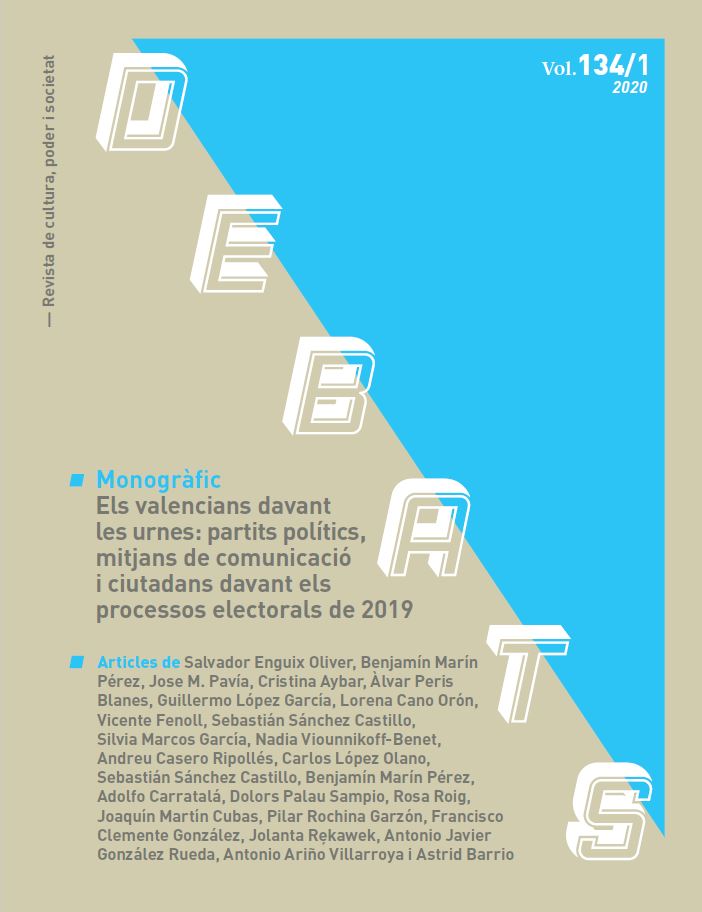The 2019 Local Elections in Valencia’s Metropolitan Area
DOI:
https://doi.org/10.28939/iam.debats.134-1.10Keywords:
elections, voting behaviour, Local Government, Metropolitan Area, Local Politics.Abstract
Voting behaviour in Valencia’s Metropolitan Area can be split into four periods: (1) During the early years of democracy
(1979-1991) following the Franco dictatorship, the area was a stronghold of the Left; (2) Yet in 1991, the City of Valencia
switched and was governed by the Right; (3) In 2011, the Right extended its control to the whole of the Metropolitan
Area; (4) In the May 2015 elections, the Left won not only in the ‘red’ metropolitan belt but also in the City of Valencia. This study looks at what happened in the last set of local elections in 2019. To this end, we begin with a brief review of the election results, voting trends, and the institutional performance of each party since the first post-dictatorship local elections in 1979. We then go on to analyse the electoral behaviour of each of the parties, breaking this down by geographical variables: town/village size, comarcas (‘counties’), and the so-called ‘red belt’ before drawing our conclusions.
Downloads
References
Castells, M. (2010). Globalisation, Networking, Urbanisation: Reflections on the Spatial Dinamics of the Information Age. Urban Studies, 47(13).
Halbert, L., Cicille, P., Pumain, D. i Rozenblat, C. (2012). Quelles métropoles en Europe? Analyse comparée. Synthèse. París: DATAR. Recuperat de https://www.cget.gouv.fr/sites/cget.gouv.fr/files/atoms/files/travaux-16_datar.pdf
Martín Cubas, J., Escribano García, C., i Jiménez Lázaro, J. i Ramis García, S. J. (2011). El comportamiento electoral en las elecciones locales del área metropolitana de Valencia: Las elecciones de 2011 y la volatilización del «cinturón rojo» de Valencia. Cuadernos Constitucionales de la Cátedra Fadrique Furió Ceriol, 75/76.
Martín Cubas, J. (2015). La ruptura de un ciclo electoral en la Comunidad Valenciana: Estudio comparado de los resultados de las elecciones locales y autonómicas de 2015 en la Comunidad Valenciana. En M. Peña Ortiz (coord.), Participació electoral i territori: Anàlisi de les eleccions municipals i autonòmiques 2015. Trobada Universitat
de València – Instituts d’Estudis Comarcals (p. 45-59). València: Servei de Publicacions de la Universitat de València.
Martín Cubas, J., Bodoque, A., Rochina, P. i Clemente, F. (2017). El comportamiento electoral en las elecciones locales de 2015 en el área metropolitana de Valencia. Terra, 3, 101-129. DOI: 10.7203/terra.3.10448
Martínez de Lejarza, J. i Martínez de Lejarza, I. M. (2002). Delimitación de áreas metropolitanas mediante un modelo anisópotro de decrecimiento exponencial: Una aplicación al caso del área metropolitana de Valencia. Estudios de Economía Aplicada, 20(2), 471-486.
Ministeri d’Interior, Govern d’Espanya. Informació electoral: http://www.interior.gob.es/informacion-electoral
Presidència de la Generalitat Valenciana, Portal d’informació ARGOS, Generalitat Valenciana: http://www.argos.gva.es/es/electoral/
Rozenblat, C. (2010). Opening the Black Box of Aglomeration Economies for Measuring Cities. Competitiveness through International Firm Networks. Urban Studies, 47(13), 2.841-2.865. DOI: 10.1177/0042098010377369
Salom, J. i Fajardo, F (2018). El área metropolitana de Valencia en el sistema global de ciudades: Los efectos de la crisis económica en la red de relaciones financieras de las empresas multinacionales. Documents d’Anàlisi Geogràfica, 64(1), 127-148. DOI: 10.5565/rev/dag.382
Downloads
Published
How to Cite
Issue
Section
License
Without prejudice to the provisions of article 52 of Spanish Law 22/1987 of November 11 on Intellectual Property, BOE (official state bulletin) of November 17, 1987, and pursuant to said legislation, the author(s) surrender(s) free of charge its rights of edition, publication, distribution and sale of the article, for its publication in Debats. Journal on Culture, Power and Society.
Debats. Journal on Culture, Power and Society is published under the Creative Commons license system in accordance with the «Recognition - Non-Commercial (by-nc) modality: The generation of derivative works is permitted provided that commercial use is not made. Nor can the original work be used for commercial purposes».
Thus, when the author submits his/her contribution, he/she explicitly accepts this assignment of publishing and publishing rights. Authors also authorize Debats. Journal on Culture, Power and Society to include their work in an issue of the journal to be distributed and sold.











